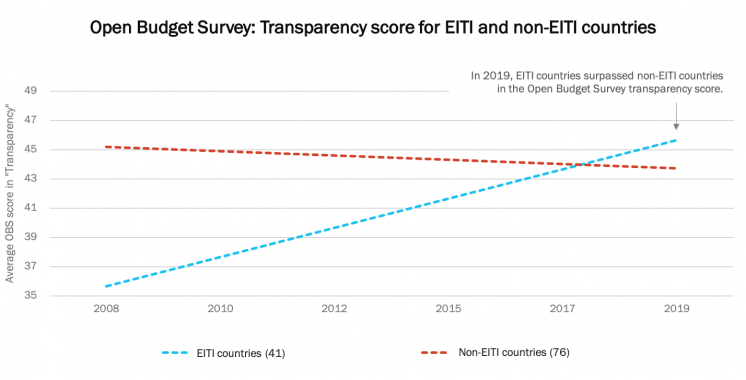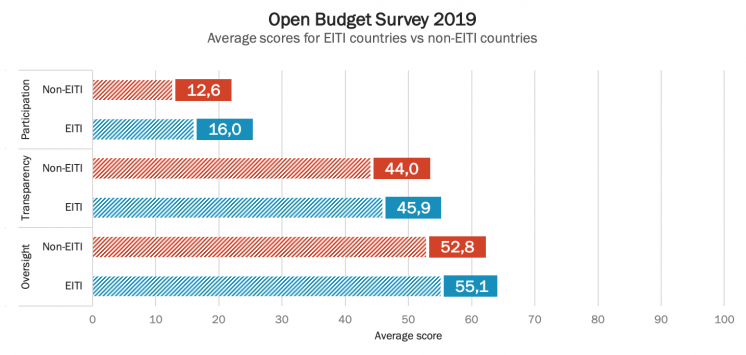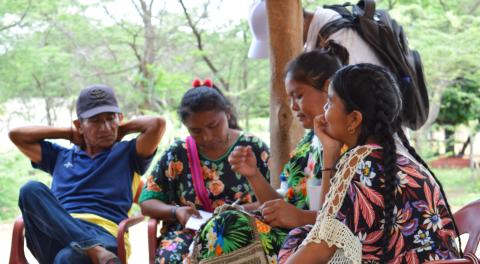
Twelve years of transparency: How EITI implementing countries are progressing in the Open Budget Survey
How EITI implementing countries are progressing in the Open Budget Survey
Resource-dependent countries face many obstacles in adhering to principles of good extractives governance, including corruption and mismanagement. Enhanced fiscal transparency is vital for addressing these challenges. It is a goal shared by the EITI and the International Budget Partnership (IBP).
The EITI is serious about measuring its impact. The IBP’s Open Budget Survey (OBS) is a source of data on key dimensions of fiscal accountability, such as fiscal transparency, public participation and oversight by legislatures and independent audit institutions. Of the 77 countries surveyed in the OBS since 2008, 30 are EITI members with comparable data across all years during which the OBS was conducted.
What does the latest Open Budget Survey reveal?
A review of this recently released data yields striking results. Despite a much lower starting point, the average score of EITI implementing countries has increased faster over the last 12 years than that of non-EITI countries on the key dimension of fiscal transparency. In 2008, EITI countries lagged, scoring on average 36 out of 100 on the OBS indicator for transparency. By 2019, their average score had increased to almost 46, surpassing the average score of 44 for non-EITI countries.

In fact, EITI implementing countries have been a driving force behind the improvement in overall fiscal transparency scores for the 77 countries covered by the OBS. This group has shown sustained improvements of almost two points in each round of the OBS, while others in the index have seen stable or decreasing scores.
Corresponding time series data for the “Participation” and “Oversight” categories are not yet available. But a comparison of 2019 results illustrates a slightly higher average for EITI countries, both for public participation in the budget process as well as audit and legislative oversight. While these initial findings are encouraging, we need to await future iterations of the OBS to determine whether the correlation between EITI implementation and high OBS scores is maintained.

Looking behind the data
There is no single factor that can explain why EITI implementing countries have made such good progress in the OBS, and there are also variations in performance within the group.
However, 16 EITI implementing countries[1] stand out in the OBS 2019 and some general trends exist in their extractive governance. The Dominican Republic and Mongolia have developed extractive transparency portals, which provide additional disclosures where previously there were none. In Kyrgyz Republic and Indonesia, such systems already existed, but have been opened up to the public. Afghanistan and Senegal transitioned from more manual and paper-based ledgers to interoperable government systems that share information. Governments are already opening up these new systems, as confidence in the reliability of data grows.
An emphasis on better record-keeping for public scrutiny, effective audit procedures and public oversight to track gains from extractives revenues in budget documents may also have contributed to the improvements shown in the data.
Finding synergies
It will be interesting to see how the scores of EITI countries under the “Public Participation” category of the OBS develop. Improvements would be a welcome counterpoint to concerns about the erosion of civic space, including in countries implementing the EITI. Public participation in the budget process is fostered both through EITI’s multi-stakeholder platforms and through IBP’s emphasis on improving access to budget information and creating platforms for public engagement and feedback.
There are also complementarities in oversight mechanisms promoted by IBP and the EITI. IBP focuses attention on the importance of Supreme Audit Institutions (SAIs), understanding that if audit findings are not acted on, they are of limited use. The EITI has also recognised the importance of stronger public oversight mechanisms and increasingly works with SAIs.
Why do the findings matter?
Open budget data has additional value in shaping the availability of investor finance for governments and companies. This will be critical as resource dependent countries seek to build back their economies. Analysts seeking out data to inform investment decisions are increasingly prioritising environmental, social and governance (ESG) considerations as they respond to public pressure for responsible investment. Their needs can only be met if budgets and government data are available in open format, and if evidence of improved budget transparency through the OBS is more readily available to investors.
The EITI Standard and the OBS produce transparency scores that can inform governance dimensions of sovereign credit ratings’ governance, while the focus on public participation also improves companies’ and investors’ social license to operate. Both deserve more attention in the investor world.
In demonstrating a steady improvement in budget transparency in EITI countries – albeit with significant variation between countries – the OBS findings offer some comfort to proponents of extractives transparency.
In light of the triple crisis that resource-dependent countries face as a result of the Covid-19 pandemic, they assume greater significance. The crisis could have an adverse effect on the hard-won transparency gains evidenced by 12 years of OBS data, as governments divert resources to public health priorities and away from extractives transparency reforms. Protecting these gains and presenting evidence on progress in EITI countries can shore up support for governance reforms in the extractives sector at this challenging time.
The authors are grateful to Christoffer Claussen and Vivek Ramkumar for their advice and input on this blog.
[1] The Sixteen countries are Afghanistan, Albania, Cameroon, Democratic Republic of the Congo, Dominican Republic, Guatemala, Honduras, Kazakhstan, Kyrgyz Republic, Liberia, Mexico, Indonesia, Philippines, Mongolia, Sao Tome and Principe, and Senegal.





